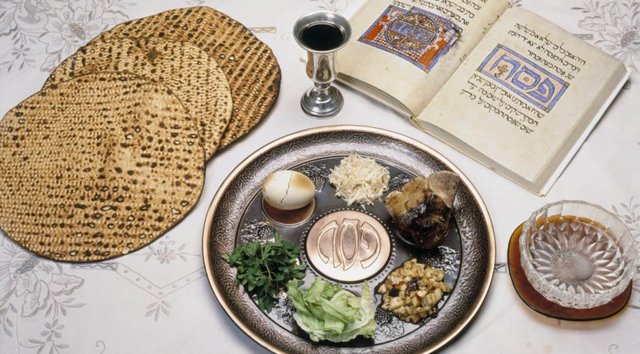Pesach: Passover
Significance: Remembers the Exodus from Egypt
Observances: Avoiding all leavened grain products and related foods; Family or communal retelling of the Exodus story
Length: 8 days (Some: 7 days)
And this day shall become a memorial for you, and you shall observe it as a festival for the L-RD, for your generations, as an eternal decree shall you observe it. For seven days you shall eat unleavened bread, but on the first day you shall remove the leaven from your homes ... you shall guard the unleavened bread, because on this very day I will take you out of the land of Egypt; you shall observe this day for your generations as an eternal decree. - Exodus 12:14-17
More: http://www.jewfaq.org/holidaya.htm
Pesach, known in English as Passover, is one of the most commonly observed Jewish holidays, even by otherwise non-observant Jews. According to the 2000-01 National Jewish Population Survey (NJPS), 67% of Jews routinely hold or attend a Pesach seder, while only 46% belong to a synagogue.
Pesach begins on the 15th day of the Jewish month of Nissan. It is the first of the three major festivals with both historical and agricultural significance (the other two are Shavu'ot and Sukkot). Agriculturally, it represents the beginning of the harvest season in Israel, but little attention is paid to this aspect of the holiday. The primary observances of Pesach are related to the Exodus from Egypt after generations of slavery. This story is told in Exodus, Ch. 1-15. Many of the Pesach observances are instituted in Chs. 12-15.
The name "Pesach" (PAY-sahch, with a "ch" as in the Scottish "loch") comes from the Hebrew root Pei-Samekh-Cheit Pei-Samekh-Cheit (in Hebrew), meaning to pass through, to pass over, to exempt or to spare. It refers to the fact that G-d "passed over" the houses of the Jews when he was slaying the firstborn of Egypt. In English, the holiday is known as Passover. "Pesach" is also the name of the sacrificial offering (a lamb) that was made in the Temple on this holiday. The holiday is also referred to as Chag he-Aviv Chag he-Aviv (in Hebrew), (the Spring Festival), Chag ha-Matzot Chag ha-Matzot (in Hebrew), (the Festival of Matzahs), and Z'man Cheiruteinu Z'man Cheiruteinu (in Hebrew), (the Time of Our Freedom) (again, all with those Scottish "ch"s).
